|
|
|
Sort Order |
|
|
|
Items / Page
|
|
|
|
|
|
|
| Srl | Item |
| 1 |
ID:
099381


|
|
|
| 2 |
ID:
121599
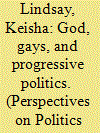

|
|
|
|
|
| Publication |
2013.
|
| Summary/Abstract |
I draw on conservative black Christians' claims regarding their co-constitutive racial, religious, class, and sexual subordination to demonstrate that intersectionality is a heuristic that can be used to advance a range of normative arguments. My research rejects traditional understandings of intersectionality as a necessarily progressive analytical framework, as well as recent discussions that suggest that intersectionality's use for conservative ends is evidence of its theoretical underdevelopment. My analysis also reveals that by positing interlocking racism, classism, heterophobia, and anti-Christian bigotry as blacks' "true" experience of oppression, conservative black Christians guide political scientists to consider 1) that intersectional analysis is central rather than antithetical to in-group policing; 2) that we can best interrogate the standards that social groups use to police their boundaries when we adopt a normative-critical conception of power, and 3) that power so defined challenges the erroneous assumption that our role is to either describe or prescribe social reality.
|
|
|
|
|
|
|
|
|
|
|
|
|
|
|
|
| 3 |
ID:
108939
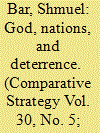

|
|
|
|
|
| Publication |
2011.
|
| Summary/Abstract |
This article discusses the influence of religion on deterrence. Faith may increase risk propensity and lower the legitimacy of being deterred. Anticipation of divine intervention, reward or punishment, adherence to an apocalyptic ideology, or (in the Shiite world) to believe in the imminent advent of the Hidden Imam reduces susceptibility to deterrent threats. Religious motivation can, however, be potentially exploited to enhance deterrence. Superstitions can induce courage and self sacrifice but may also induce fear and mass hysteria. Prophecies too are a two-edged sword; believers, who receive divine guarantees that a certain event will not happen, may lose faith in the face of the occurrence of that event.
|
|
|
|
|
|
|
|
|
|
|
|
|
|
|
|
| 4 |
ID:
098854
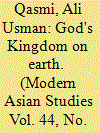

|
|
|
|
|
| Publication |
2010.
|
| Summary/Abstract |
This paper evaluates in detail the policies adopted and the religious ideas held by the power elite of Pakistan during the years from 1947 to 1969. It has been argued that the religious worldview of the power elite was shaped by the discourse of Islamic modernism which allowed envisioning of a state in which (at least theoretically) democracy, rights of minorities, sovereignty of the parliament and flexibility of Islamic laws could be propagated as the guiding principles of the state. Also, by focusing on the life and ideas of Ghulam Ahmad Parvez and by disclosing the details of his close connivance with General Ayyub Khan during the 1960s, the paper will highlight the steps taken to institutionalize Islamic modernism in Pakistan.
|
|
|
|
|
|
|
|
|
|
|
|
|
|
|
|
| 5 |
ID:
107465
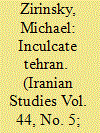

|
|
|
|
|
| Publication |
2011.
|
| Summary/Abstract |
his essay discusses the establishment of Alborz College by American Presbyterian missionaries. Alborz's early years, before its 1940 nationalization by Iran, were shaped by the vision of its first president, Samuel Jordan, a liberal, athletic, pragmatic Christian reformer who led by example, a practitioner of what we now call "social work" and an encourager of female empowerment. Alborz and the Presbyterian mission which gave it birth grew in the context of American social history, including the religious awakening of the early nineteenth century, American doctrines of freedom and universal education, as well as the contradictory impulses of ethnocentricity and ecumenicism. The essay is based on private and governmental archival sources and the experience of the author as a high school student in Tehran.
|
|
|
|
|
|
|
|
|
|
|
|
|
|
|
|
| 6 |
ID:
100712
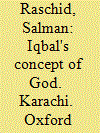

|
|
|
|
|
| Publication |
Karachi, Oxford University Press, 2010.
|
| Description |
xxvii, 122p.
|
| Standard Number |
9780195476941, hbk
|
|
|
|
|
|
|
|
|
|
|
|
Copies: C:1/I:0,R:0,Q:0
Circulation
| Accession# | Call# | Current Location | Status | Policy | Location |
| 055530 | 297.211/RAS 055530 | Main | On Shelf | General | |
|
|
|
|
| 7 |
ID:
169283
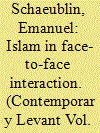

|
|
|
|
|
| Summary/Abstract |
Zakat is the Islamic obligation to give away a share of one’s moveable wealth for the sake of the community—primarily supporting people in need. Based on fieldwork in the Palestinian city of Nablus (2013–2014) where institutional channels for distributing zakat had become blocked due to security crackdowns in 2008, this article analyses direct zakat practices where givers and receivers confront one another in face-to-face interaction. In Nablus, openly displayed material want was assumed to ‘expose’ people living in poor households as well as their relatives and neighbours. Against this background, direct zakat manifested itself as discreet gestures of ‘covering’ need, while people not asking openly for support tended to be praised for their shyness and piety. In direct zakat transfers, people actively cared for how they appeared to one another in social interactions. This ‘ethical work’ of presenting oneself involved reading signs, embodying Muslim virtues and invoking God as the sole source of material provision. Considering the Islamic tradition’s presence within social interactions, this article seeks to understand how Muslim piety exceeds the individual and how the moral responsibility to cover the needs of others is socially distributed.
|
|
|
|
|
|
|
|
|
|
|
|
|
|
|
|
| 8 |
ID:
165479


|
|
|
| 9 |
ID:
112368
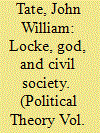

|
|
|
|
|
| Publication |
2012.
|
| Summary/Abstract |
Timothy Stanton is the latest in a line of Locke scholars who, in focusing on Locke's theological commitments, have sought to place these at the center of his political philosophy. Stanton insists that those who interpret Locke's political philosophy in more material terms, centered on individual liberty, government authority, and the need to reconcile both via consent, apply to it a misleading "picture" and fail to perceive its essentials. By showing that this is precisely how Locke himself intended his political philosophy to be understood, with the theology substantially removed, this article shows how Stanton is profoundly mistaken in his interpretation of Locke.
|
|
|
|
|
|
|
|
|
|
|
|
|
|
|
|
| 10 |
ID:
122531
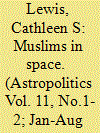

|
|
|
|
|
| Publication |
2013.
|
| Summary/Abstract |
The first men to fly into space precipitated comments about religion and God, but for most of the history of human spaceflight these comments related to Christianity. As International Space Station partners recruit spacefarers from Islamic countries, they face new religious challenges. Islam is distinct from other large monotheistic religions by virtue of the fact that Muslim worship practices require routine attention to Earth geography and astronomy. It is a vantage point that changes in low Earth orbit. Recent Muslim astronauts and cosmonauts have led the way in adapting religious practices to their position above the Earth.
|
|
|
|
|
|
|
|
|
|
|
|
|
|
|
|
| 11 |
ID:
112369
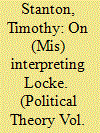

|
|
|
| 12 |
ID:
137387
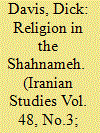

|
|
|
|
|
| Summary/Abstract |
This article discusses the reasons why Ferdowsi does not begin the Shahnameh with the episode of Zoroaster, which he quotes from the version of Daqiqi, but rather with an account of the creation of the world that, in contrast to Islamic historians writing before Ferdowsi, does not attempt to accommodate a Qur'anic view of creation and human history, but neither does he give a cosmology dominated or well informed by Zoroastrian theology. Similarly, Ferdowsi tends to present pre-Islamic Iran as having a consistent religious history, and perhaps avoids beginning with Goshtāsp's conversion to the religion of Zoroaster, as he makes Daqiqi appear to do, in order to minimize the role of religious conflict in Iranian history, again diverging from historians of the Islamic period writing before him. The article also explores the role of God in the Shahnameh and the absence of theodicy.
|
|
|
|
|
|
|
|
|
|
|
|
|
|
|
|
| 13 |
ID:
098983
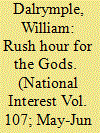

|
|
|
|
|
|
|
|